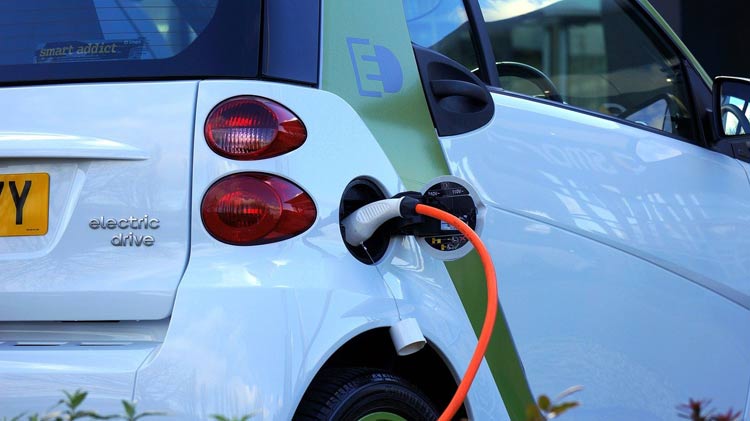
With various applications such as autonomous driving, user behaviour monitoring, and smart navigation systems, AI is playing a key role in the EV Industry.
We know, the Electric Vehicle revolution is speeding up all over the World and different models are out there in the market. EVs are expected to attain price parity with traditional combustion- engine vehicles within the next five years and a major credit of this goes to the role of Artificial Intelligence. AI is poised to give electric vehicles a boost by hastening advancements in battery technology. According to worldwide market estimates, the AI in Automotive Market would develop at a CAGR of more than 35 percent between 2020 and 2026. AI is extensively used in manufacturing, assembly lines, and many EV players are testing self-driving EVs to gather data, analyze and repair Electric Vehicles.
With AI and machine learning, Electric Vehicle manufacturers have the ability to process massive amounts of sensor data faster than ever before, giving companies an unprecedented chance to improve upon existing maintenance operations and even add something new – predictive maintenance.
Nischal Chaudhary, Founder – Batt:RE Electric Mobility told exclusively to CircuitDigest, “The EV industry will advance considerably due to the induction of Artificial Intelligence as it will make the life of riders easy and convenient. Auto manufacturers are rapidly upgrading their existing production systems by incorporating AI platforms. These companies are increasingly focusing on developing autonomous vehicles to improve passenger mobility.”
“There is evolution happening in automobiles, especially the EV industry, which will change the experience. Artificial Intelligence will cause a profound disruption by streamlining production capabilities and augmenting business growth. It can be useful in many applications such as repairing the EV, figuring out the problem area, finding the nearest workshop & recharge centers, and can also be helpful in the safety of the electric vehicle as it can switch off the e-bike or e-cars from the mobiles,” added Nischal.
You can check out this exclusive interview “Over the Next Decade, EV Industry might see a Growth Rate of 100% per annum- Nishchal Chaudhary” to know more about the several disruptions in the Indian Electric Vehicle sector.
How AI is Accelerating the Power of EV Batteries
In every aspect of a vehicle's life, battery performance is a crucial factor to consider. The battery accounts for 25% of the entire cost of an electric vehicle and when it comes to EV developments, nothing is more important than increasing battery life. Artificial intelligence has made aspirations like recharging an electric vehicle in the time it takes to stop at a gas station a reality, and it might help enhance other elements of battery technology as well. The scope of the global battery market is rapidly increasing. EV models like Tesla S 100D offers 355 miles, Hyundai Kona offers 198 miles, or MG ZS EV could offer 214 miles on average and none can be fully charged in a matter of minutes. For instance, at Tesla supercharging station, EVs will take 75 minutes to reach full charge, and Indian players in the EV industry would require more than 3 hrs for a full charge.

“Artificial intelligence is analyzing battery usage, recharge data and constructing a mathematical model to optimize the fast-charging capabilities without compromising the life span of the vehicles, which is improving battery performance and battery life cycle management, including driving range and charging time, and life span of the vehicles. It can also help accelerate the battery field research by speeding up the search for better materials and testing”, said Satyajit Sinha, Senior Analyst - IoT Analytics.
Speaking further about the deployment of AI in Electric Vehicles, Faisal Kawoosa, Founder - techArc mentioned that “AI is contributing significantly in the overall battery management in electronics. It has been there for some time now in smartphones where AI helps to increase the charge of a battery, reduce time to charge and also improves the life of the battery. For instance, AI keeps a check on the temperature of the battery and responds with safety measures in case of overheating, etc. Similarly, it’s helping optimize the energy efficiency in EVs as well.”
Future of Artificial Intelligence in EV Industry
With various applications such as Autonomous driving, user behaviour monitoring, and Smart navigation systems, AI is playing a key role in the EV Industry. It can be used for safety applications like predictive maintenance of equipment, driver behaviour monitoring, and vehicle security. Different companies are using Artificial Intelligence in their vehicles, some use this technology to change current transportation systems with self-driving services, while some use it for strengthening the battery power of their EVs.

Kawoosa stated his views on the scope of AI in EV Industry and said that “In EV verse, there will always be an attempt by the industry to achieve efficiency on several things. These include maximising the charge, increasing the charging time, increasing the life of the battery, optimizing the use of battery in all electronics including lights, increasing the maximum speed, increasing acceleration, safety and security, among others. AI can add that requisite intelligence to EVs to make efficient use of resources. Not only in EVs but in entire automobile sector, AI has a greater role to play. It would not be wrong to say that after Smartphones, cars might be the biggest users of AI in years to come.”





